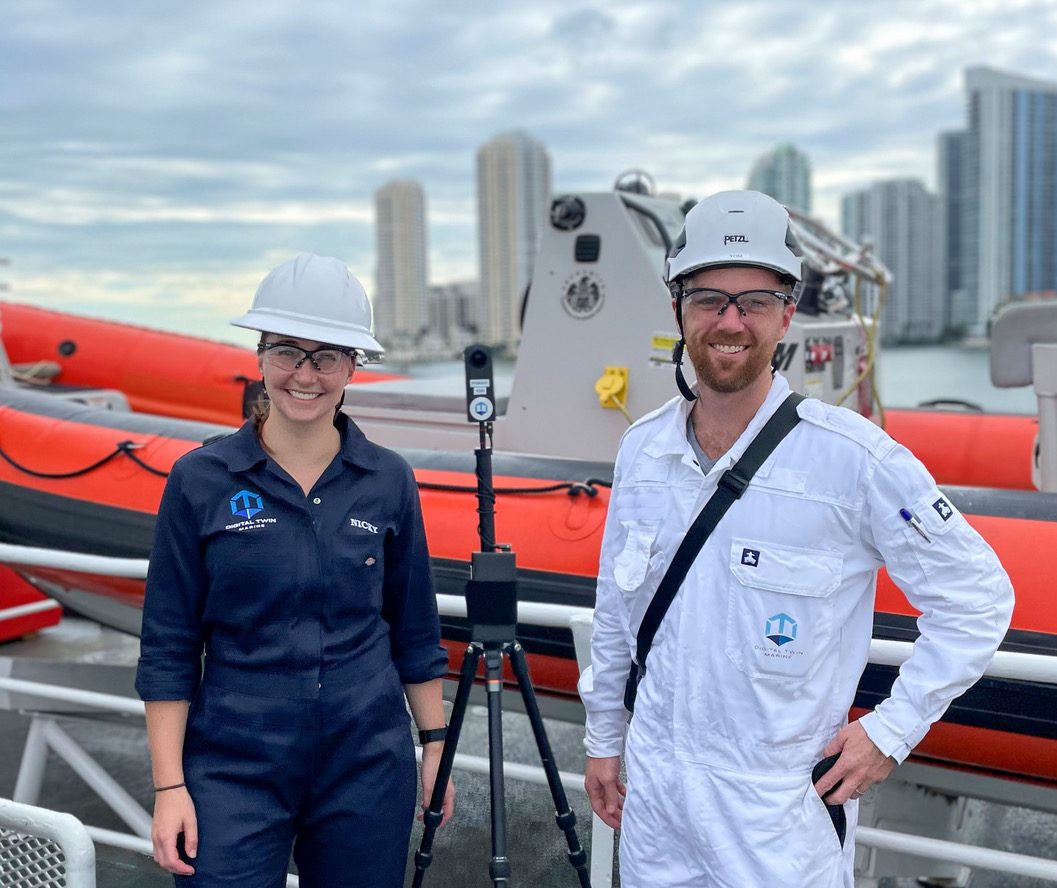By Riley Kaminer
Boating is big business in South Florida. The marine industry’s economic impact weighs in at upwards of $12 billion in gross output across Miami-Dade, Broward, and Palm Beach.
The local importance of this industry is not lost on the husband-wife duo that founded Digital Twin Marine, a Fort Lauderdale-based startup that creates custom 3D models of ships.
CEO Nicky Bruger and CTO Tom Bruger first began to develop the startup around the onset of the pandemic. Since 2012, Tom had worked as a ship inspector – surveying upwards of 1,200 ships over nine years. When Covid hit, Tom started doing remote inspections.
“We were overseeing inspections, but people were doing them by streaming footage from their cameras,” Tom told Refresh Miami. “I found it to be an insufficient way of doing remote work.”
Meanwhile, Nicky was working in the construction department of AutoNation. In this role, she was using digital twin technology to manage projects that weren’t nearby.
As they worked together through lockdown in their guest bedroom, Tom observed Nicky’s ability to work remotely and had a lightbulb moment. “Tom realized that there was an opportunity in maritime to leverage similar technology to help maritime companies operate better,” recalled Nicky.
And thus Digital Twin Marine was born. Tom left his job to work on the platform full-time in June 2020, followed by Nicky in 2021.

While Digital Twin Marine does not develop the technology they use to create the 3D models, their application of the technologies is innovative. They use different tools depending on the task at hand. But typically it involves sending either a person or a small robot around the ship capturing footage using LiDAR scanners and 360 degree cameras.
This approach enables the startup to deliver their final product to customers in a matter of days rather than the months it would take to create the same digital twin using a computer modeling system. And Tom asserts that this can be done at a much more accessible price to boot.
Digital Twin Marine’s main customers are commercial shippers, shipyards, and yachts. Use cases include remote bidding – getting estimates on projects without having people step on board – remote training of crew, remote inspections, safety briefings, and marketing.
“Our digital twins pay for themselves if it saves the client from having to travel out to visit their vessel or shipyard once or twice,” said Tom. Pricing depends on the boat’s square footage and use of the digital twin, as well as what it will take to provide the service.
The startup is currently in the second cohort of 35 Mules, FPL’s accelerator for early-stage companies. Nicky and Tom first heard about the program after placing second in a business plan competition as part of UF’s South Florida MBA program, from which Tom recently graduated and Nicky is about to graduate.
“The coaching from professionals at such an established company is really invaluable,” commented Nicky. “Their goal is to help Florida businesses grow and attract people to Florida, and help us without taking equity.”

READ MORE ON REFRESH MIAMI
- Togal.AI lands top prize at eMerge, enabling growth of construction planning platform
- FPL doubles down on South Florida startup scene with its 35 Mules program
- This Boca startup is on a mission to save Christmas – or at least drive supply chain efficiencies
- Pandemic-fueled e-commerce boom blasts SellersFunding of Weston to new levels of growth
- Ready to cruise the seven seas in style? Boatsetter has got you covered
- Brought together by tech, kept together by culture: Miami’s protagonistic role in LatAm’s startup story - April 15, 2024
- New World Angels launches Innovation Fund to write pre-seed checks - April 12, 2024
- Sortium scores $4M to pioneer the future of game production (hint: it’s web3 and AI) - April 11, 2024





